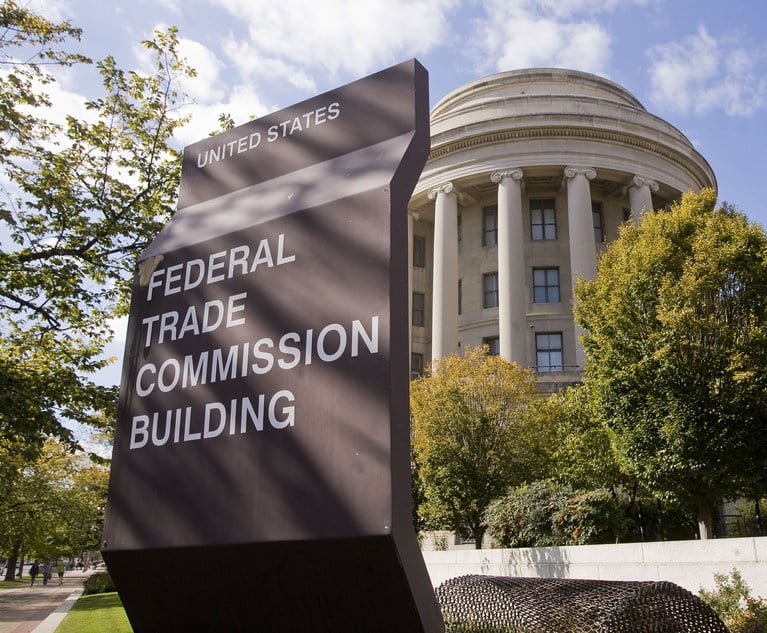 John Ring testifies during his confirmation hearing in March. Photo: Diego M. Radzinschi / NLJ
John Ring testifies during his confirmation hearing in March. Photo: Diego M. Radzinschi / NLJBig Law Firms Have a Lot to Say About NLRB's 'Joint Employer' Maneuvering
The National Labor Relations Board has received thousands of comments on its proposal to embrace a new business-friendly standard for defining joint-employer relations. Here's what some big U.S. firms said on behalf of clients and practice groups.
February 05, 2019 at 01:53 PM
8 minute read
Updated on Feb. 6
Numerous business groups are pressing the National Labor Relations Board to embrace a business-friendly approach when it comes to establishing whether two companies are “joint employers” sharing liability for any labor violations.
The Trump administration's board chairman, John Ring, a former Morgan, Lewis & Bockius partner in Washington, months ago called for comments from business and labor groups about whether and how to revise the Obama-era standard set in the 2015 case Browning-Ferris Industries.
The board's proposal would dial back the Obama-era expansion and limit joint-employer relationships to only those where one company exercises “substantial, direct and immediate control over the essential terms and conditions of employment” of the other company. The proposal would eliminate liability for an employer that exercises indirect influence.
Rulemaking is rare at the labor board, which more often uses cases to articulate new standards for the labor and management community. The board's proposal has drawn tens of thousands of comments from business groups, labor advocates and others.
“Rulemaking is appropriate for the joint-employer subject because it will permit the board to consider and address the issues in a comprehensive manner and to provide the greatest guidance,” Ring said last year. “Although legal standards of general applicability can be announced in a decision of a specific case, case decisions are often limited to their facts. With rulemaking, by contrast, the board will be able to consider and apply whatever standard it ultimately adopts to selected factual scenarios in the final rule itself.”
The joint-employer debate has been a top priority for the business community. The new Republican majority unsuccessfully tried to use a new case to overturn Browning-Ferris, but the attempt failed amid an ethics flap involving member William Emanuel. The board's ethics officials said Mendelson should have been recused based on his former firm, Littler Mendelson, representing a party.
What follows is a snapshot of some of the comments from Big Law firms and labor advocates that have come in.
>> Jenner & Block partner Cynthia Robertson in the firm's Washington office wrote in support of the proposal on behalf of the government contracting and defense industry community. Robinson said in her comment: “My clients include defense companies operating in the heavy industrial space. These companies employ thousands of organized workers in over 100 different trades. The flexibility provided by temporary staffing is critical to cost-effective production for our national defense. Treating my clients' temporary workers as 'employees' would not be feasible.” She added: “A simple, easy-to-apply standard that does not unreasonably sweep temporary contract workers under a 'joint employee' standard should be the Board's goal.”
➤➤ Get employment law news and commentary straight to your in-box with Labor of Law, a new Law.com briefing. Learn more and sign up here.
>> Polsinelli shareholder Jess Dance in the firm's global franchise and supply chain practice said he supported the board's efforts to clarify the standard. “Our franchisor clients have experienced significant distress and confusion” in the years since the Browning-Ferris decision was issued, said Dance, based in the firm's Denver office. He said franchisors have made “significant changes to the way they interact and support franchisees.” Dance said “many franchisors now provide less franchisee support, training, brand standards inspections, and/or business coaching out of fear that such franchisee support or interactions may trigger joint-employment liability under Browning-Ferris.” He added: “Such franchisor reduction in franchisee support jeopardizes implementation and enforcement of system-wide brand standards and uniformity, thereby harming the overall franchise system, individual franchisees, and customer experiences.”
>> Steptoe & Johnson partner Douglas Kantor in Washington submitted a comment to the labor board on behalf of the National Association of Convenience Stores, Society of Independent Gasoline Marketers of America. Kantor said these retailers find the expansive joint employment standard difficult to wrangle and would hurt the franchise model. “There has been considerable confusion regarding what constitutes a joint employer relationship since the Board's 2015 ruling that an employer could be considered a joint employer if they had the potential to determine essential terms and conditions of employment, regardless of how such businesses actually acted in practice. This is of particular concern to the retail fuel and convenience store industry as many of these businesses operate under the franchisee/franchisor or similar business models, which tend to raise joint employer questions.”
 Ogletree offices in Washington DC. Photo: Diego M. Radzinschi/NLJ
Ogletree offices in Washington DC. Photo: Diego M. Radzinschi/NLJ
>> Mark Kisicki and Elizabeth Soveranez of Ogletree, Deakins, Nash, Smoak & Stewart, filed a letter representing the Council on Labor Law Equality, whose members are large, national employers. The Ogletree team said “the uncertainty Browning-Ferris created undermines stability in labor relations.” They added: “Stability in labor relations can be achieved only by clarity and consistency. The board's proposed rule would provide both.” The lawyers also said a recent ruling by the U.S. Court of Appeals for the D.C. Circuit only further muddied the waters. The court supported the Obama-era joint-employer rules but said they were misapplied in the case involving Browning-Ferris and remanded the dispute to the board for further review. “While commentators often have different perspectives about the impact of a particular court decision, they seldom disagree about what the court's holding was,” the Ogletree attorneys said in their comment letter.
Among the thousands of comments, here are several others from advocates and from the NLRB general counsel:
>> Craig Becker, former NLRB board member who's now general counsel to the AFL-CIO, said rulemaking wasn't an appropriate avenue to decide the joint employment question. He said the board has historically used cases to resolve and clarify standards that govern the workplace. Becker predicted the new rule will not provide the clarity that either side seeks. “The board states that rulemaking permits greater public input,” Becker wrote. “But even assuming that is true, it does not explain why rulemaking is appropriate here when rulemaking has not been and is not being used in the myriad other areas that the board regulates via adjudication.”
>> The NLRB's general counsel Peter Robb joined the debate, and he said the rules proposed by the board do not go far enough to satisfy the concerns of the business community. His comment is significant, not only because of his leadership role at the agency, but also because the board is required to respond to this comment and could potentially alert its rule based on his response. Robb wrote: “The board will certainly need to provide more granular, nuanced, and useful indications of the exact parameters of the joint employer definition in the final rule itself, in comments or explanation attendant to the rule, or in future adjudication or rulemaking.” He warned of “endless litigation and piecemeal decisions” without effective guidance on the question.
>> The liberal Economic Policy Institute said in a comment letter that the proposed guidance would harm workers. Celine McNicholas, EPI's director of government affairs and labor counsel, and Heidi Shierholz, who leads EPI's policy team, wrote: “The proposed change in the joint-employer standard under the (The National Labor Relations Act) would result in fewer joint-employer findings, leaving more workers unable to hold the firms that play a role in determining the terms and conditions of their employment accountable for violations of labor law.” The EPI argued that the board has advanced a standard “narrowed to the point at which many workers would find it nearly impossible to bring all firms with the power to influence their wages and working conditions to the bargaining table—frustrating workers' fundamental right under the NLRA to engage in collective bargaining.”
|Correction: An earlier version of this report misidentified the last name of Jenner partner Cynthia Robertson.
This content has been archived. It is available through our partners, LexisNexis® and Bloomberg Law.
To view this content, please continue to their sites.
Not a Lexis Subscriber?
Subscribe Now
Not a Bloomberg Law Subscriber?
Subscribe Now
NOT FOR REPRINT
© 2024 ALM Global, LLC, All Rights Reserved. Request academic re-use from www.copyright.com. All other uses, submit a request to [email protected]. For more information visit Asset & Logo Licensing.
You Might Like
View All
$10M John Deere Bribery Settlement Underscores Risks of Not Integrating Acquisitions

Natalie Black Kohler, Legal Chief of Bath-Fixture Giant for 26 Years, Dies at 74
3 minute read
'Strong' Legal Theory or 'Oxymoron'? Experts Eye FTC Antitrust Suit Against Mattress Merger
5 minute read
Child Labor Probe Hammers Tennessee Factory, Highlighting Risks to Employers From Feds' Stepped-Up Enforcement
6 minute readTrending Stories
Who Got The Work
Michael G. Bongiorno, Andrew Scott Dulberg and Elizabeth E. Driscoll from Wilmer Cutler Pickering Hale and Dorr have stepped in to represent Symbotic Inc., an A.I.-enabled technology platform that focuses on increasing supply chain efficiency, and other defendants in a pending shareholder derivative lawsuit. The case, filed Oct. 2 in Massachusetts District Court by the Brown Law Firm on behalf of Stephen Austen, accuses certain officers and directors of misleading investors in regard to Symbotic's potential for margin growth by failing to disclose that the company was not equipped to timely deploy its systems or manage expenses through project delays. The case, assigned to U.S. District Judge Nathaniel M. Gorton, is 1:24-cv-12522, Austen v. Cohen et al.
Who Got The Work
Edmund Polubinski and Marie Killmond of Davis Polk & Wardwell have entered appearances for data platform software development company MongoDB and other defendants in a pending shareholder derivative lawsuit. The action, filed Oct. 7 in New York Southern District Court by the Brown Law Firm, accuses the company's directors and/or officers of falsely expressing confidence in the company’s restructuring of its sales incentive plan and downplaying the severity of decreases in its upfront commitments. The case is 1:24-cv-07594, Roy v. Ittycheria et al.
Who Got The Work
Amy O. Bruchs and Kurt F. Ellison of Michael Best & Friedrich have entered appearances for Epic Systems Corp. in a pending employment discrimination lawsuit. The suit was filed Sept. 7 in Wisconsin Western District Court by Levine Eisberner LLC and Siri & Glimstad on behalf of a project manager who claims that he was wrongfully terminated after applying for a religious exemption to the defendant's COVID-19 vaccine mandate. The case, assigned to U.S. Magistrate Judge Anita Marie Boor, is 3:24-cv-00630, Secker, Nathan v. Epic Systems Corporation.
Who Got The Work
David X. Sullivan, Thomas J. Finn and Gregory A. Hall from McCarter & English have entered appearances for Sunrun Installation Services in a pending civil rights lawsuit. The complaint was filed Sept. 4 in Connecticut District Court by attorney Robert M. Berke on behalf of former employee George Edward Steins, who was arrested and charged with employing an unregistered home improvement salesperson. The complaint alleges that had Sunrun informed the Connecticut Department of Consumer Protection that the plaintiff's employment had ended in 2017 and that he no longer held Sunrun's home improvement contractor license, he would not have been hit with charges, which were dismissed in May 2024. The case, assigned to U.S. District Judge Jeffrey A. Meyer, is 3:24-cv-01423, Steins v. Sunrun, Inc. et al.
Who Got The Work
Greenberg Traurig shareholder Joshua L. Raskin has entered an appearance for boohoo.com UK Ltd. in a pending patent infringement lawsuit. The suit, filed Sept. 3 in Texas Eastern District Court by Rozier Hardt McDonough on behalf of Alto Dynamics, asserts five patents related to an online shopping platform. The case, assigned to U.S. District Judge Rodney Gilstrap, is 2:24-cv-00719, Alto Dynamics, LLC v. boohoo.com UK Limited.
Featured Firms
Law Offices of Gary Martin Hays & Associates, P.C.
(470) 294-1674
Law Offices of Mark E. Salomone
(857) 444-6468
Smith & Hassler
(713) 739-1250










